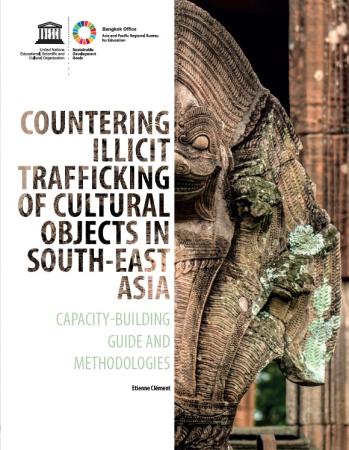ACTIONS
- Protect and safeguard cultural and natural heritage
- Learning and educational opportunities
- Cultural participation/social inclusion
- Sustainable tourism
- Support research
- Employment (recruiting, training, safety)
- Energy consumption, greenhouse gas emissions
- Waste management and reduction
- Transport (forms of, energy use)
- Commercial activities including copyright and IP
- Governance and management
- Security, disaster preparedness, risk reduction
- External partnerships and collaborations
- Publication/report
- Sign-post to other resource (database)
- Training modules
Countering Illicit Trafficking of Cultural Objects in South-east Asia - Capacity Building Guide and Methodologies

Intended Audience
Government and ministry staff and officers, museum staff, legal practitioners, police, custom, security guards who work in the museum, historical sites, collections-based institutions, registrars, due diligence check personnel, antique dealers and collectors.
- E. Clément, UNESCO Office Bangkok and Regional Bureau for Education in Asia and the Pacific
- “To empower human resources involved in the prevention of illicit trafficking of cultural property as well as the restitution of stolen or illegally exported cultural objects;
- To promote the relevant Conventions and the need to adopt an effective national legislation;
- To establish and reinforce preventive measures of all kinds;
- To develop networks at local, national and regional levels to ensure general awareness of the adverse consequences of trafficking of cultural property;
- To promote better law enforcement;
- To develop national coordination for the implementation of legislation and to promote international cooperation in this area.” (p.6)
Avaiable in
- English
SDGs LINKAGES
This open-access training guide helps personnel whose work involves combatting with illicit cultural objects trade and cultural heritage loss. Topics and contents presented are related to SDG targets 4.7 (organize dedicated training programme and educate related personnel on the matter), 11.4 (safeguard cultural heritage), 16.4 (combat organized crime and cultural objects restitution), 16.6 (transparent institutions to uphold cultural heritage-related laws and fulfill legal obligations), 16.A (strengthen cooperation among countries in Southeast Asia, UNESCO and UNIDROIT), 17.9 (the resource as a capacity-building guide that helps consolidate stakeholders’ knowledge and strategies), 17.16 (involve all possible parties and stakeholders to share expertise), and 17.17 (encourage public-private and civil society partnerships).
Click on the SDG Target to discover Our Collections Matter indicators
-
Our Collections Matter indicators:
- Numbers of people in each type of programme drawing on collections from different demographic groups.
- Increases in numbers of people in each type of programme from different demographic groups.
- Proportion of people involved in such programmes in relation to overall audience size.
- Evidence that learners have acquired knowledge and skills to promote sustainable development.
-
Our Collections Matter indicators:
- Total expenditure (public and private) per capita spent on the preservation, protection and conservation of all cultural and natural heritage, by type of heritage.
- Plans, policies and procedures in place for the safe use of collections for a variety of purposes, protecting and safeguarding both collections and those who use them.
- Plans, policies and procedures in place for the identification, safeguarding and protection of cultural and natural heritage at risk.
- Collecting programmes in place to protect, safeguard and make use of cultural and natural heritage, addressing the needs of communities and stakeholders, and ensuring that collections can be an effective resource for sustainable development.
- Number and diversity of educational, awareness-raising, research programmes, and partnerships that aim to strengthen protection of cultural and natural heritage.
-
Our Collections Matter indicators:
- Identification of stolen assets, return of stolen assets.
- Collections development, education, awareness-raising and partnership activities relating to organized crime, with a view to combatting organized crime everywhere.
-
Our Collections Matter indicators:
- Proportion of the population [audience/users/non-users] satisfied with their last experience of public services.
- Access to information, and accountability policies and mechanisms, in place.
- Effective institutional arrangements, both for own working and for working in partnership with other sectors, in place.
- Plans and arrangements in place for extraordinary circumstances such as natural and human-caused disasters.
- Effective arrangements in place to fulfil legal and social obligations and responsibilities.
- Effective arrangements in place for transparent communication and reporting of institutional performance.
- Effective arrangements in place for transparent decision-making and accountability.
-
Our Collections Matter indicators:
- Effective relationships in place between national organisations and crime reduction agencies.
- Finances in place to support national initiatives to combat terrorism, crime and/or violence in relation to collecting institutions.
- Policies and plans in place to prevent and/or reduce the risk of violence, terrorism or crime in relation to collecting institutions.
-
Our Collections Matter indicators:
- Number and diversity of international capacity-building activities to aid implementation of each and all of the SDGs.
- Number and diversity of North-South, South-South, and/or triangular co-operations and partnerships to aid implementation of each and all of the SDGs.
-
Our Collections Matter indicators:
- Number and/or increase in number, and diversity of global and international multi-stakeholder partnerships that share collection-related knowledge, expertise, technology and financial resources to address the SDGs, or that otherwise involve collections-based organisations and institutions.
- Number and/or increase in number, and diversity of global and international multi-stakeholder partnerships involving developing countries that share collection-related knowledge, expertise, technology and financial resources to address the SDGs.
-
Our Collections Matter indicators:
- Amount of United States dollars committed to public-private and civil society partnerships.
- Number and/or increase in number, and diversity of local, national and regional multi-stakeholder (public, public-private and civil society) partnerships that address the SDGs drawing on collections, or that otherwise involve collections-based organisations and institutions.
